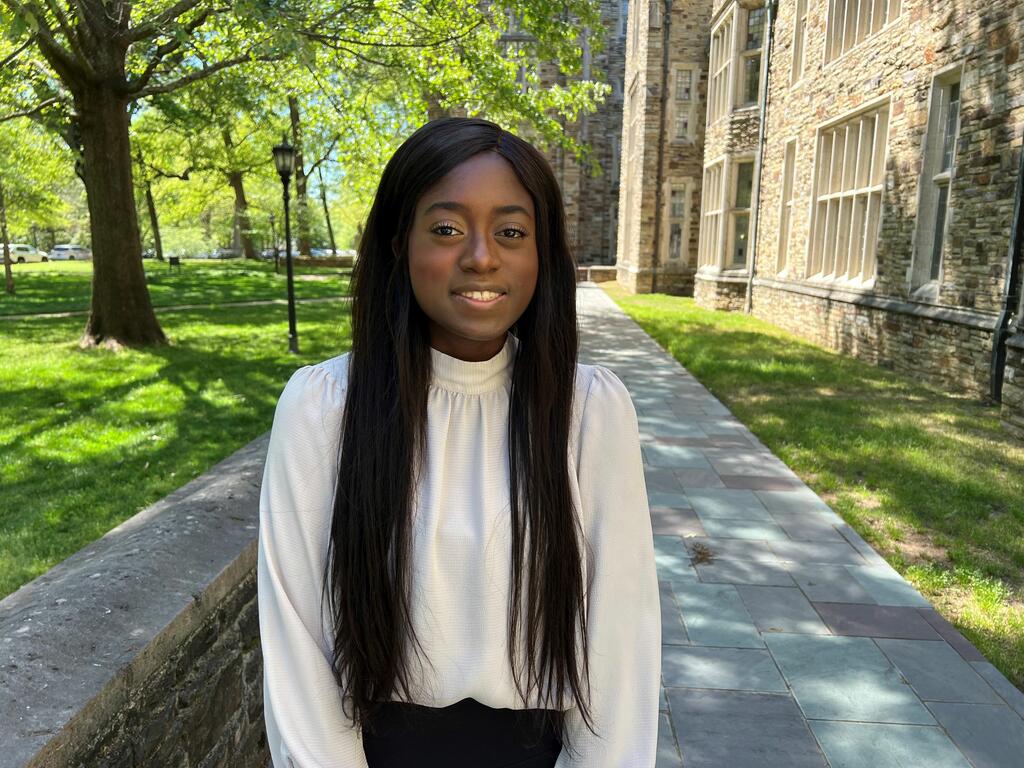Jannelle Bannor’s desire to become a physician developed when she was a teenager and observed the compassionate care administered to her older sister, who is a cancer survivor. She chose chemistry as her major at Rhodes and took advantage of the college’s Health Professions Advising (HPA) Office, which creates an environment of support and opportunity through programming and campus/community partnerships.
Now the senior from Chattanooga, TN, has been accepted to 16 medical schools, including Meharry Medical College, Medical College Wisconsin, Wayne State School of Medicine, Kansas City University’s College of Osteopathic Medicine, Kansas College of Osteopathic Medicine, Arkansas College of Osteopathic Medicine, Philadelphia College of Osteopathic Medicine, Rocky Vista University College of Osteopathic Medicine, RVU Montana, Lincoln Memorial Debusk, William Carey University College of Osteopathic Medicine, Noorda College of Osteopathic Medicine, University of Pikeville College of Osteopathic Medicine, New York Institute of Technology College of Osteopathic Medicine, A.T. Still Kirksville College of Osteopathic Medicine, and Baptist Health Sciences University.
Most of these schools focus on osteopathic medicine in which Doctors of Osteopathic Medicine (DO) treat and manage diseases and disorders with consideration of the mind, body, and spirit.
“Although my current path is allopathy (MD), I am deeply interested in osteopathy due to the strong alignment between my values and the DO philosophy, specifically its focus on rural medicine and underprivileged health care,” said Bannor. “After aiding a rural Appalachian community as a patient care assistant (PCA) in 2022, I knew I wanted to dedicate my career as a holistic physician, specifically providing comprehensive, whole-person health care to the medically underserved.
“As a PCA working with diabetic amputees, one pattern I recognized in several of my patients was their diminished access to health care and limited nutritious food options due to their food-deserted locations. This greatly contributed to their worsening neuropathy. Working with this patient base and learning their stories left an incredible impact on me.”
Over the past four years, Bannor also has gained clinical experience as a COVID-19 health screener, personal crisis counselor, hospice volunteer, and an obstetrics and gynecology (OB/GYN) medical assistant. Doctors of Osteopathic Medicine practice in various medical specialties, including OB/GYN, primary care, pediatrics, emergency medicine, psychiatry, and surgery.
Obstetrics and gynecology is the field Bannor envisions herself specializing in. As a medical assistant, Bannor provided guidance to expectant mothers in their bi-weekly visits and helped young women concerning their reproductive health.
“I feel a strong gravitation toward OB/GYN due to its patient base, the long-lasting patient-physician relationships I witnessed, and the joy of working with expectant mothers,” said Bannor. “Each of my clinical experiences has taught me that I want to become a physician who alleviates the distress and ailments of my patients through a lens of compassionate, diligent, and empathic health care.”
At Rhodes, Bannor is president of the student chapter of the American Chemical Society, secretary of the college’s chapter of Gamma Sigma Epsilon national chemistry honor society, and a member of the STEM Cohort Mentoring Program.
“I wouldn’t be in the position I am today without being a Rhodes student,” said Bannor. “Incredible advisors through HPA and Rhodes academic faculty have guided my journey to medicine in immeasurable ways. As a student, I truly experienced the dedication of the HPA staff––Lauren Pringle and Jessica Kelso––through the countless meetings, guidance, and mock interview prep to set me up for success. As a chemistry major, the academic faculty have been incredibly formative in my scientific knowledge and foundation building, from MCAT studies to medical school prep. And this certainly has deepened my love for learning.”
